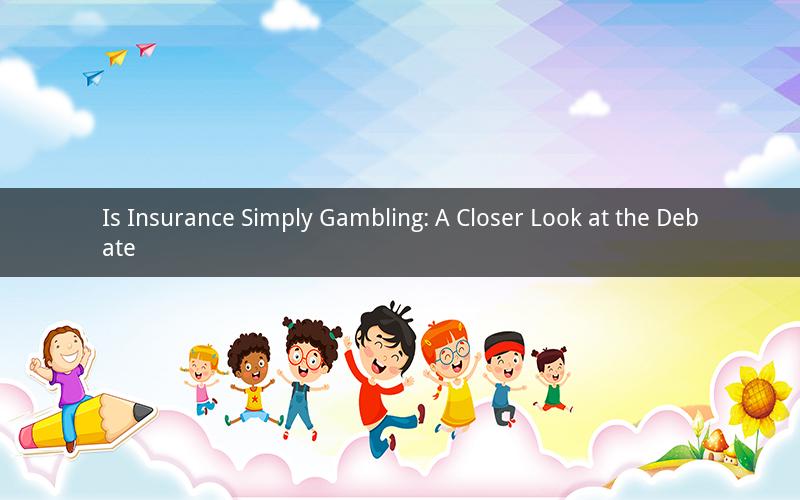
Insurance is an integral part of our lives, offering protection against unforeseen events and providing peace of mind. However, the concept of insurance has often been compared to gambling, sparking a heated debate. This article explores the similarities and differences between insurance and gambling, examining the arguments from both sides to determine whether insurance is merely a form of gambling.
Similarities Between Insurance and Gambling
1. Uncertainty: Both insurance and gambling involve uncertainty. In insurance, policyholders pay premiums in exchange for protection against potential future events, such as accidents, illnesses, or property damage. In gambling, players wager money on the outcome of a game, hoping to win more than they lose.
2. Risk Assessment: Insurance companies and gamblers both need to assess and manage risk. Insurance providers analyze the likelihood of an event occurring to determine premium rates, while gamblers consider the odds of winning or losing when placing bets.
3. Potential for Loss: In both insurance and gambling, there is a possibility of losing money. In insurance, policyholders may pay premiums for years without ever making a claim, resulting in a financial loss for the insurance company. In gambling, players may lose money more frequently than they win.
Differences Between Insurance and Gambling
1. Purpose: Insurance is designed to protect against financial losses, while gambling is solely for entertainment or the chance to win money. Insurance provides a safety net, ensuring that policyholders can recover from unforeseen events, while gambling does not offer any form of financial security.
2. Legal and Ethical Considerations: Insurance is regulated by government agencies to ensure that it provides fair and transparent coverage. Insurance companies are required to maintain reserves to cover potential claims. In contrast, gambling is often regulated by local governments and may be subject to stricter regulations, depending on the jurisdiction.
3. Predictability: Insurance policies typically offer predictable outcomes, with clear terms and conditions. Gamblers, on the other hand, face unpredictable outcomes based on chance and probability.
Arguments for Insurance Being a Form of Gambling
1. Premiums as Wagering: Critics argue that insurance premiums can be seen as a form of wagering, as policyholders are paying money for the chance to recover losses. However, this argument overlooks the purpose and benefits of insurance, which are not solely focused on the potential for financial gain.
2. Uncertainty of Claims: The uncertainty of whether a policyholder will make a claim can be seen as similar to the uncertainty in gambling. However, insurance is structured to provide coverage and support in the event of a loss, while gambling is designed for entertainment purposes.
Arguments Against Insurance Being a Form of Gambling
1. Financial Security: Insurance provides financial security and peace of mind, as it ensures that policyholders can recover from unexpected events. In contrast, gambling does not offer any form of financial security and is purely for entertainment.
2. Legal and Ethical Framework: Insurance is subject to legal and ethical standards that ensure fairness and transparency. Gambling, while regulated, does not always adhere to the same level of oversight and can sometimes be associated with unethical practices.
Related Questions and Answers:
1. Question: Is insurance mandatory in all countries?
Answer: No, insurance is not mandatory in all countries. The requirement for insurance varies by jurisdiction and depends on the specific type of insurance.
2. Question: Can insurance policies be canceled at any time?
Answer: Generally, insurance policies cannot be canceled at any time. Most policies have a cancellation period or require notice to cancel, and there may be penalties or fees associated with early termination.
3. Question: Are insurance companies profit-driven?
Answer: Yes, insurance companies are profit-driven, like any other business. However, they are also regulated and are required to maintain reserves to cover potential claims.
4. Question: Can insurance premiums be adjusted based on the individual's risk?
Answer: Yes, insurance premiums can be adjusted based on the individual's risk. Factors such as age, health, and driving history are considered when determining insurance rates.
5. Question: Is it better to have multiple insurance policies or rely on a single policy for comprehensive coverage?
Answer: It depends on the individual's needs and circumstances. While having multiple policies may provide additional coverage, it can also result in higher premiums. It is important to assess the specific requirements and compare the coverage and costs of different insurance options.